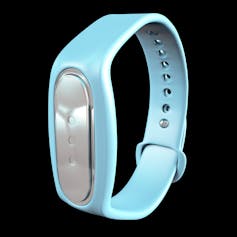How fitness trackers help motivate us to keep in shape
Authors: Craig Donnachie and Kate Hunt, University of Glasgow
How fitness trackers help motivate us to keep in shape

<span class="attribution"><a class="source" href="https://www.paimages.co.uk/image-details/2.5300151">PA</a>, <a class="license" href="http://creativecommons.org/licenses/by-sa/4.0/">CC BY-SA</a></span>
</figcaption>Craig Donnachie, University of Glasgow and Kate Hunt, University of Glasgow
Like many of the shiny new technologies that come out of California, the world embraced the fitbit wristband in a huge wave of enthusiasm when it was launched in 2012. But it wasn’t just a cool, must-have fad. The range of health and fitness trackers and weareable tech has since multiplied, reflecting the widespread desire to be physically active.
But while many of these technologies are expensive (fitbits can cost hundreds of pounds), the experiences of men who took part in Football Fans in Training (FFIT) – a weight loss and healthy living programme developed for men through coaches at top professional football clubs – suggests that even cheap and cheerful pedometers can be really useful in supporting people trying to get fit. We don’t all need an expensive fitbit.
There is strong evidence that being physically inactive poses a serious risk to our health. Besides myriad health benefits, being active has been shown to play a key role in long-term weight loss and in positive mental health. Given all these pluses, it’s really important that we understand how to support people across all walks of life to become more physically active.
Although some people find it hard to find and keep the motivation to change unhealthy habits, more and more studies are demonstrating that using devices to monitor physical activity, such as basic pedometers that count every step we take, is an effective way for people to increase it.

</figcaption>
</figure>While men are often portrayed as uninterested in their health, past research has shown that many enjoyed using pedometers to measure their progress. Wearing and checking even a simple pedometer can help us to take small steps towards big changes, especially as part of a fitness programme.
However, the ways in which self-monitoring tools (including wearable fitness trackers and smartphone apps) may help motivate longer-term increases in physical activity levels after fitness programmes have come to an end, are less well understood.
Motivation: quality not quantity
Being sufficiently motivated plays a pivotal role in whether people are able to increase and maintain their physical activity levels. But not all forms of motivation are equally powerful. According to a prominent theory in this area called Self-Determination Theory, three broad forms of motivation exist which vary in their quality.
When a person does something freely, willingly and with a positive attitude, it usually indicates higher motivational quality (autonomous motivation), whereas if a person does an activity mainly in response to others’ demands or pressures such as rewards, competition or comparison with others, this is indicative of lower motivational quality (controlled motivation). In contrast, a state of amotivation is when a person has no desire to take part in an activity at all.
Within this theory, greater motivation depends on three basic “needs”: autonomy, competence and relatedness. Autonomy is the need to feel a sense of ownership over your actions; competence is the need to feel adequately challenged and experience a sense of accomplishment; and relatedness is the need to feel connected to others and supported in your endeavours.
Both autonomous (higher) and controlling (lower) forms of motivation can prompt changes in our behaviour, but autonomous motivation is more enduring and beneficial in the longer term, particularly for physical activity and weight loss.
In a study we carried, we interviewed 28 men who had completed the 12-week FFIT programme to find out about their experiences of using pedometers as motivational tools during the programme and also after it had ended.

Positive changes
The findings show how goal-setting and self-monitoring of progress using pedometers supported the development of high-quality (autonomous) motivation for physical activity, during and after taking part in the FFIT programme.
Some men who successfully made changes said they no longer used the pedometer as their new, more active lifestyles had become second nature and being active in their day-to-day lives had become part of their identity. Others still used their self-monitoring devices because they enjoyed keeping track of how active they were and it helped them sustain their increased activity levels.

One man described it as being a “big part of the daily motivation to do something”, even months after finishing the programme, while another said it enabled him to “see what you’re actually achieving” and so boosted his self-confidence.
However, for a small minority – men who had struggled to make or sustain improvements in their activity levels – the pedometer was experienced as “dispiriting” because it confirmed their lack of success. One man described the pedometer as being like a “governor” and said he felt “ruled” by the pedometer.
These men were unlikely to report using self-monitoring tools once the 12-week programme had ended. They were also less successful in losing weight during the programme and seemed more reliant on support from the coach and other group members to keep them motivated.
Our research shows that pedometers and other activity tracking devices are seen as really helpful motivational tools by men to support them in making long-term lifestyle changes and becoming more active, both during and after taking part in a weight loss and healthy living programme.
Identifying the men who were motivated most by external factors, such as comparing themselves with others, and the men who simply disliked using activity trackers, may help highlight those who need some extra support in discovering more valued and relevant reasons for keeping fit and active.
Enjoyment, an improved sense of well-being and even rediscovering aspects of our youth are all reasons that would motivate even the most reluctant among us to lace up our trainers.
Craig Donnachie, Research Assistant, MRC/CSO Social and Public Health Sciences Unit, University of Glasgow and Kate Hunt, Associate Director of the Social and Public Health Sciences Unit, University of Glasgow
This article is republished from The Conversation under a Creative Commons license. Read the original article.







